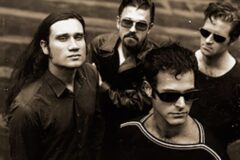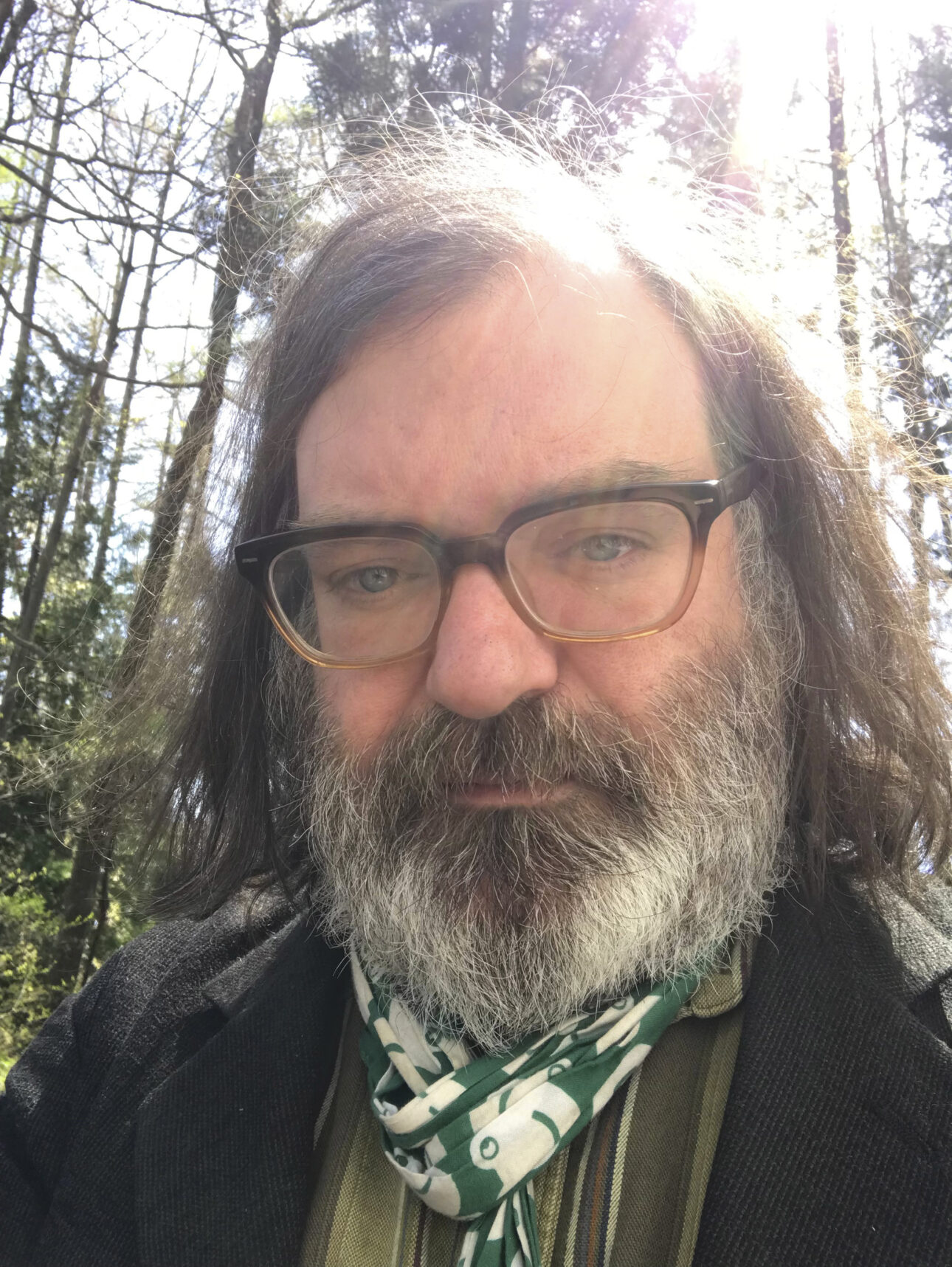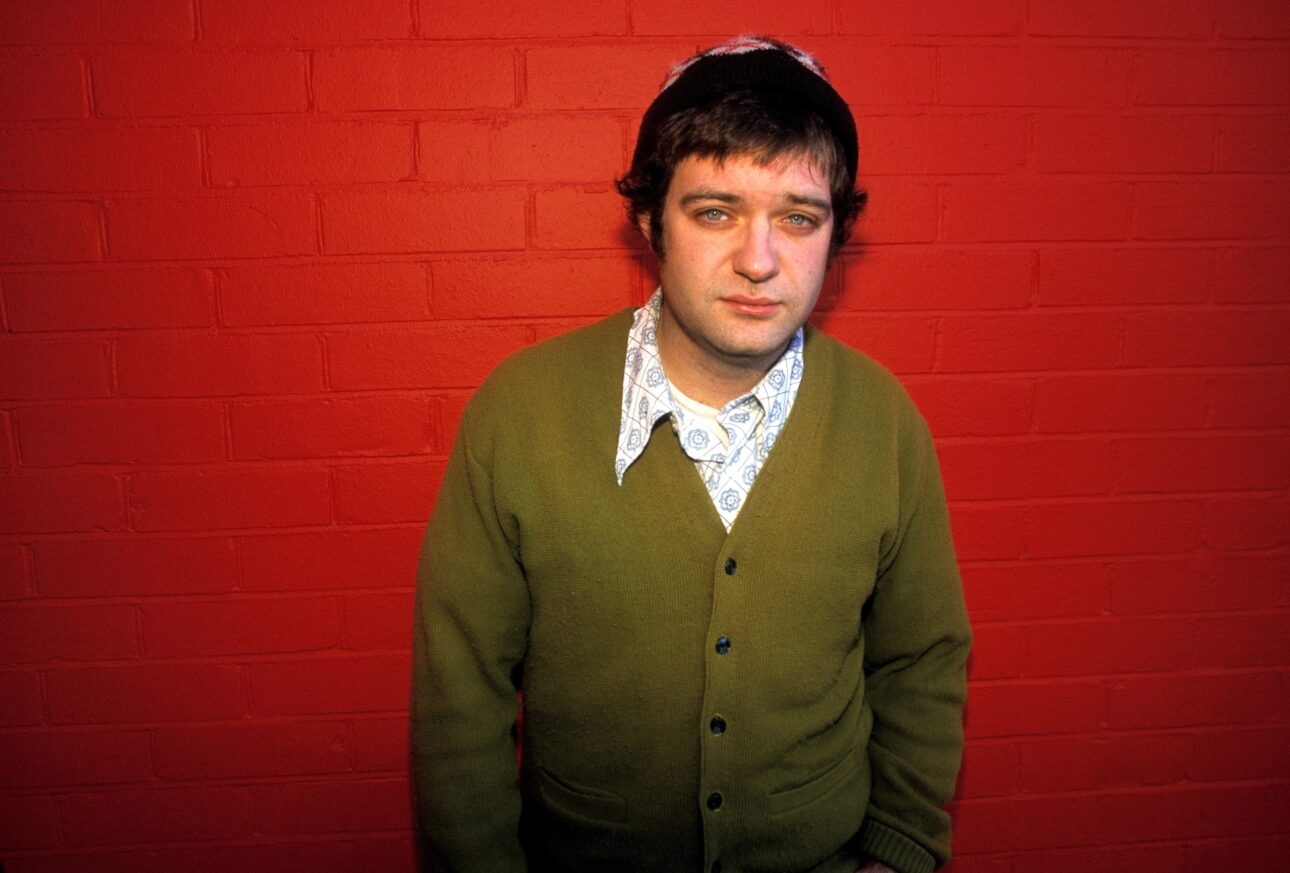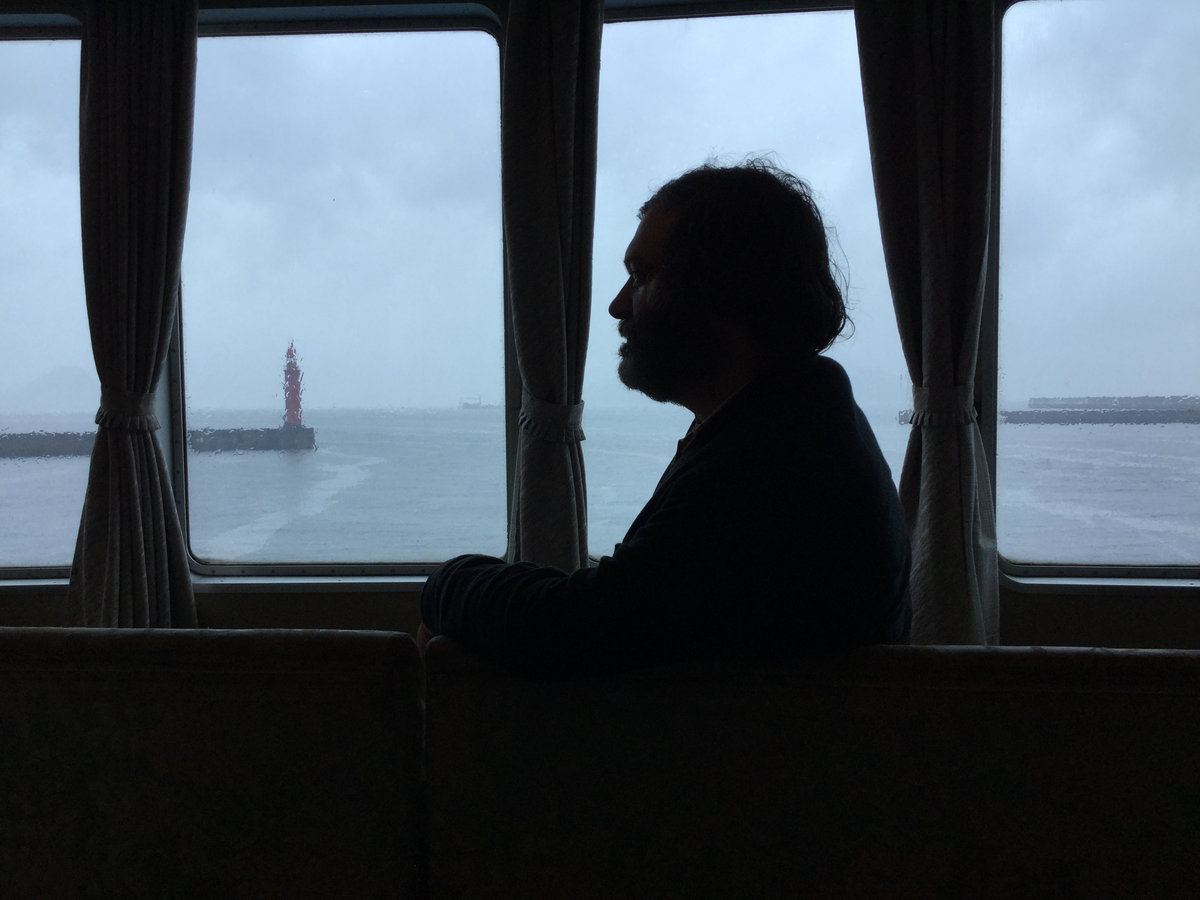“Forgive me — I just woke up 10 minutes ago,” Jim O’Rourke says over Zoom from two hours outside of Tokyo, where he’s called home since leaving the U.S. during the second term of the George W. Bush administration. Enlivened by coffee and cigarettes, the bearded, scarf-clad 54-year-old experimental music legend settled in to discuss his recent Drag City soundtrack for Kyle Armstrong’s 2021 film Hands That Bind, which has made the rounds at numerous film festivals but has yet to see wide release.
Set in a farming community in ‘80s-era Alberta, Canada, Hands That Bind stars Paul Sparks, Bruce Dern, and musician Will Oldham in a tale of familial struggle and increasingly strange occurrences. O’Rourke’s score mirrors that “prairie gothic” vibe with soundscapes both boundless and intimate, relying largely on Kyma sound design software rather than acoustic or electric instruments (“I personally almost never touch an instrument anymore and sold most of them a couple years ago,” he says).
Beyond his 60-plus avant-garde Steamroom releases on Bandcamp, soundtrack work with Werner Herzog and Harmone Korine, collaborations with musical and life partner Eiko Ishibashi, and his ongoing oversight of the massive archive of late German electronic music pioneer Roland Kayn, O’Rourke is also revered for his work with David Grubbs in the late, great Gastr Del Sol, his production and mixing work on Wilco’s Yankee Hotel Foxtrot and A Ghost Is Born, and his six-year stint as an official member of Sonic Youth, with whom he made three superlative, late-career albums. The artist dropped some knowledge on all these subjects and more with SPIN, including whether he’ll ever return to the traditional song-based albums he hasn’t released since 2015’s Simple Songs.

Also Read
30 Overlooked 1994 Albums Turning 30
SPIN: Is this really the first “original motion picture soundtrack” to be released with your name on it?
Jim O’Rourke: To be released outside of Japan, yes. Actually, let me think. That’s the line Drag City is going with, so let’s say yes [laughs].
Based on the fact that you’ve been making music for 30-plus years, it’s somewhat surprising it never happened before.
You know, it’s because I’ve never wanted to release a soundtrack. Usually when you do music for a film, it’s maybe at most 18 or 20 minutes of music, and they’re all little one-minute bits. I don’t think that works as a record. This time, Kyle the director really, really wanted there to be a soundtrack for the film. He had his heart set on it. Because of the kind of film it is, and the music made for the film, I thought, well, this stuff can be reshuffled and put together in a way that at least makes it an album. I didn’t want to just put out the cues you hear in the movie. I told him, it has to work as a record or I won’t do it. Once I started putting together the soundtrack, I realized it has music I made for the movie that isn’t even in the movie. I wasn’t even thinking about the film anymore at that point. The only other time a full soundtrack came out was for a film in Japan I did music for. In that case, it was because I was too scared of the director to say no [laughs].
Hands That Bind still hasn’t been widely released, so in some strange way, the music is the most easily accessible aspect of the film at this point. How did it come together?
I’ve worked with Kyle before and have scored almost all of his films. The first thing I did with him was quite a long time ago, which was a short film about the Northern lights narrated by Will Oldham. A person I knew who had worked for an English DVD company called Masters of Cinema was involved with Kyle’s film, so he asked me to get involved. Kyle’s fairly hands-off. He usually has one or two things that he wants, which in this case were cues from my Steamroom releases on Bandcamp. Even to the point of adding or not adding music at points, he lets me go outside the usual parameters.
Compared to the trailer, the ground feels less stable in the film, which is appealing to me. Usually when you do a film score, at least for me, the first thing is, what is the sound color that will really work for this, and share the same space the film has created? That came fairly quickly this time. Once I decided to use the different tuning system, it made everything really, really easy. That was the pivot where everything made sense.
Was there a key instrument, piece of gear, or musical idea for this project?
Usually an octave is split into 12 notes, but I used a tuning system split into 32. The idea here was to be able to play chords that seem like they’re right, but there’s something that’s off. My friend Marty Holoubek played double bass on some songs, but we re-tuned it so he was playing what he thought it should play but it was just a bit wrong. One thing Kyle really wanted was this string quartet of mine from the ‘90s, which he had a recording of. People are playing one note treated with ring modulators, so these chords have all these overtones and they just kind of sit still. Because they’re so dense vertically, it’s kind of like juggling. You do this down below, and all this stuff happens up here (moves hands as if he’s juggling). Nothing is moving and everything is locked, but your eyes and ears are darting up and down.
There are points in the film where things that shouldn’t happen do happen. That’s where that musical stasis occurs. The main character is starting to notice this, and it’s causing everything in his life to fall apart. That’s where the non-traditional tuning system fits in. It offers a contrast between a static, monolithic sound, and something falling apart around the edges. Mostly I use Kyma for everything now. Even some of the violins are generated in Kyma.
Because it has some semblance of a drum kit, ‘A Man’s Mind Will Play Tricks on Him’ almost feels like it could turn over into a more traditional ‘song.’
That is used during a long shot of two guys walking along a road that goes nowhere [laughs]. A lot of the film is big vistas of rural Canada. I live out in the countryside in Japan as well, and when you look out, there’s constant non-activity happening.
So is it accurate that the versions of the music on the soundtrack are longer and/or distinct from the film?
Yeah. One or two are really close to how they are in the film and they come at dramatic peaks, but they’re definitely longer. They’re also collaged at points. I didn’t want it to just be two minutes of this, three minutes of that, and four minutes of something else. The length of the pieces on the soundtrack was based on how this worked as a record, and not what they represented in the film. A lot of film music doesn’t really translate to a listening experience without the visual. The one Drag City put out as a video is not even in the film [laughs].

Are there any film scores you hold dear as a listener?
I love Michael Small and obviously I love Jack Nitzsche. David Shire’s The Taking of Pelham 123 is absolutely fantastic. I was a movie fanatic as a kid, and Michael Small’s score for The Parallax View really struck me. I was also into Charles Ives, and that soundtrack was the crossover. I didn’t understand what Charles Ives was then, and I’m not saying I even do now, but at that point, there was something about it that hooked me. Hearing that world of sound in films was really big for me. Jack’s score for One Flew Over the Cuckoo’s Nest — it’s obvious I’ve ripped that off my entire life [laughs]. It’s just remarkable. On the other hand, I’ve never been a collector of film scores. I would have rather been a film editor or something like that, compared to doing scores. But Michael Small is someone I wish people knew more about. He was so great. It’s so sad he passed away so young.
To an observer, you and Will Oldham have moved in similar circles seemingly forever. How long have you known each other?
I think I met him around 1994, which was because of the whole Drag City/Louisville influx into Chicago. Will has always been very nice to me, but I’ve actually not spent that much time with him. I honestly have probably only met him six or seven times. The last was maybe five years ago when he came to Japan with Bitchin Bajas. It was him singing over synths, so he asked me to sit in and it was very nice to see him. I did work on a record with him once, but it wasn’t ‘with’ him. It was an EP he did with Rian Murphy called All Most Here, which originally was going to be songs Will wrote, Rian produced, and they’d send off to people like Polly Jean Harvey to sing. Rian asked me to do the arrangements, which I think were added to by Archer Prewitt. In the end, Will ended up singing all the songs himself. He’s still an enigma to me.

Wilco’s new LP was just announced, and it’s the first time they’ve worked with a producer since they did it with you on A Ghost Is Born.
I hope Jeff’s OK [laughs].
In retrospect, isn’t it a bit funny to think about the handwringing over Reprise dropping the band because they thought Yankee Hotel Foxtrot was uncommercial?
That major-label world is a world that really doesn’t exist anymore. I saw it a bit from being in the wrong place for the wrong time, because I obviously don’t belong in that world, and two or three years later, I realized I really didn’t belong in that world!
But it sounds like you still have fond memories of working with Wilco?
My part of all this was just Jeff and [drummer] Glenn [Kotche], and Glenn was only my friend at that point in the Yankee Hotel story. He and I were not related to Wilco at all. There was this new friend Jeff who was like, help me! I said, I can help you [laughs]. We remade parts of that record in the mix. I really enjoyed making A Ghost Is Born because it was the closest I ever got to the old-school idea of a producer in the studio. I was in the control room. It was also the only time I produced an album without engineering the recording. The engineer was very, very good. I would have preferred to have done it myself, and there were one or two things I asked him to do that he didn’t agree with, but I understand the politics. I think he maybe felt like he was in a tough situation, because I was the producer and it was obvious I was going to mix it. We were in a studio that was friendly to me and Wilco, so I could understand his frustration. He did a very good job, but that said, I did have to make some adjustments later in the mix that I wouldn’t have otherwise. I don’t think I’ve ever said that stuff before! That must have been sitting in my stomach for 20 years [laughs]. It’s not 100% the record I thought it should have been, but it was really close. Jeff was sick during that time too, so it felt a bit triumphant when it did finally come out. I’m not a pop music fan and I don’t really listen to music for entertainment, but that album isn’t entertainment and that’s why I like it [laughs].
It has been eight years since Simple Songs was released. Are you really finished with making ‘song-based’ music in this style?
Oh, yeah. That’s done [laughs]. Even the way the LP cover was constructed was like, that’s the end of that. It did what it needed to do and I don’t need to do any more of it.
Well, as sad as that may be to some of your fans, there’s some incredible live footage on YouTube of you performing that material in 2015.
If you go back and watch it, I am fucking terrified. That show was so terrifying. The songs aren’t easy to play, even though they don’t sound all that difficult. I think that’s the only time I sang and played them at the same time, because we did a few rehearsals and I wouldn’t sing during them. At the end of the song ‘Last Year,’ you can kind of see me in the video saying to the band in Japanese, ‘Jesus Christ, we got through that!’
There’s a moment on the latest Steamroom release that seems to be bits of a conversation or argument. What the heck is that?
When I make those things, sometime I take little breaks and look at YouTube to be braindead for a couple minutes. I found a clip of some guy who goes around and cuts people’s wired headphones and gives them earbuds instead. There was something about the way he was saying ‘you don’t need headphones’ that made me laugh so hard. I was thinking of a transition from one bit to another, and this was so perfect. That particular Steamroom is made from sounds of a three-minute recording of the seashore. In Kyma, sometimes I record examples to process things or make the sound itself, and in this case, I was working on something to change the harmonic and overtone structure of what I’d put in. So with that audio clip, I just loved how stupid the guy sounded. I haven’t been to the States in 20 years, and I can only observe from the outside what it seems like America has turned into. That guy’s voice sounded like what it might feel like to talk to a young person in the States now [laughs hard]. It was so dystopic. It shouldn’t be something that makes me laugh, but it did.
What else have you been working on?
These days, I’m mostly working on restoring the Roland Kayn archive. If you want to enjoy any song-based stuff from me vicariously, Eiko is working on her new record now, and I’m working on that. Until just recently, Eiko was making the soundtrack to the new Ryusuke Hamaguchi film. He was trying to get it into the Venice Film Festival, so we were working around the clock on it. I’m the in-house engineer for Eiko [laughs]. I mostly spend my time studying. Music-wise, it’s the Kayn archive, which is going to take a long time, and Eiko’s new record. I haven’t heard it, but I’ve heard there’s another Kaiji Haino/Oren Ambarchi/me trio record coming. That’s what Oren told me. I don’t remember the show, but supposedly it happened. It would have been many years ago by now. We only played at this one club in Tokyo, which is now closed, and Oren hasn’t been back here in five years. I have to admit, I’m not the best person to ask about what’s happening with me [laughs].




